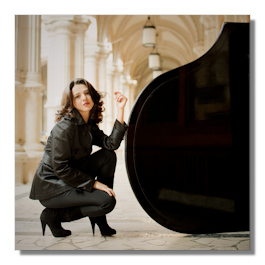
The Internet's Premier Classical Music Source
Related Links
- Latest Reviews
- More Reviews
-
By Composer
-
Collections
DVD & Blu-ray
Books
Concert Reviews
Articles/Interviews
Software
Audio
Search Amazon
Recommended Links
Site News
 Concert Review
Concert Review
Buniatishvili in London

- Jean Sibelius: Karelia Suite, Op. 11
- Edvard Grieg: Piano Concerto in A minor, Op. 16
- Antonín Dvořák: Symphony #7 in D minor, Op. 70
Khatia Buniatishvili, piano
Philharmonia Orchestra/Paavo Järvi
London, Royal Festival Hall, 7 April 2013
At first glance, the concert of the Philharmonia Orchestra conducted by Paavo Järvi at the London Royal Festival Hall on April 7 couldn't have been further removed from the "blazing originality" label that the orchestra's 2012/13 cycle at the Southbank Centre brandishes on its posters and programs. Sibelius' Karelia Suite, Grieg's Piano Concerto and Dvořák's Seventh Symphony seem rather safe Sunday matinee fare instead. Yet with an electrifying Khatia Buniatishvili bringing insight and character to the Grieg, with an inspired maestro and above all a Philharmonia in tremendous doing, the concert was nothing short of revelatory.
Sibelius' Karelia Suite was a pleasant curtain-raiser. Järvi evidently took delight in letting the toe tapping Intermezzo flow by itself, only coaxing some force for the climax. He instilled the Ballade with graceful lyricism and soft color (highlighting the superb Philharmonia strings but also the lovely cor anglais from Jill Crowther), and kept the big guns for the closing March. The horns took a while to settle in, but the other orchestral sections sounded auspiciously good.
Almost a year ago I heard Khatia Buniatishvili play Edvard Grieg's Piano Concerto, also conducted by Järvi but with the Münchner Philharmoniker. If anything, her performance has become more compelling still, partly because the Philharmonia Orchestra appeared a lot more pliant and polished than their Bavarian colleagues and a mutual interpretational approach could be shared with far greater conviction. Buniatishvili gave a similar edge-of-seat, give-it-all reading, unpredictable and combining blistering, red-hot passages with tender musings, and complementing fiery power and attack with subtle, gossamer pianissimi that held the audience spellbound. Every bar in her reading is inhabited, every note is owned, and there isn't a moment where you feel she is not in control. The first movement cadenza, a thrilling tour de force that gathers tremendous momentum seemingly out of nowhere, encapsulates the range of her approach. Järvi was in total agreement, sympathetically bending the orchestra to adapt to her flexible dynamics and tempi, and securing structural coherence. He moreover took care not to drown his soloist, while she from her side willingly shared the spotlight with the excellent orchestral contributions – as with the oboe and horn in the first movement, or the cello in the finale. One may disagree with Buniatishvili's approach, and some will always point out her playing isn't flawless, yet this is live music making of such freshness, sweep and generosity that naysayers sound like fools. Buniatishvili's Grieg was greeted by a loudly cheering audience, enough to raise doubts about the once famous British reserve and refusing to let go until she returned with Prokofiev's Precipitato from his Seventh Sonata. This has become a signature encore of hers, and continues to astound by its visceral impact.
Antonín Dvořák's Seventh Symphony was incidentally premiered by the composer in London in 1885, following a commission from the local Philharmonic Society, at the now disappeared St. James's Hall. While still overshadowed by "New World" in popularity, the Seventh ranks as one of the most mature and profound works of Dvořák's legacy, and Järvi and the Philharmonia left no doubt that it is. Brahms and even Wagner are never far away in this symphony and blend skillfully within the Bohemian surroundings. Capitalizing upon the transparency and quality of the different sections of the orchestra, Järvi carved sonorities and balance as with a chisel, yet without ever sacrificing the tempos. The Allegro maestoso convincingly allied the energy and drama of the main subject with the lyricism of the second in F major, however it was the beautiful Poco Adagio with its Wagnerian and Brahmsian echoes that seduced most in this reading. Järvi kept a steady pace, hardly lingering anywhere, but still brought out the immense tenderness and sensuality of this movement. The Philharmonia woodwinds and brass were outstanding throughout, while the antiphonally placed strings, ardent and warm, displayed the full range of textures to thrilling effect. In the Scherzo, Järvi held a light dansante touch, giving the Bohemian furiant rhythms extra lilt. The Finale with its complex thematic material and varying moods was held together with a sure hand and brought to a thrilling ending. It also allowed us to appreciate once more the art of veteran Andrew Smith, who has been the Philharmonia's timpanist for 40 years (only the third since the creation of the orchestra), contributing in no small measure to the excitement.
In short, even if not of blazing originality, this was a concert of blazing brilliance.
Copyright © 2013, Marc Haegeman












